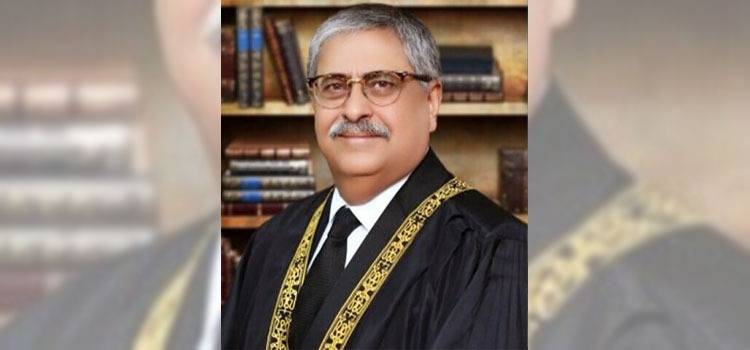
Justice Athar Minallah – a judge of the Supreme Court of Pakistan – on Friday released a detailed note on the suo motu proceedings into Punjab and Khyber Pakhtunkhwa elections.
On March 27, Justices Mansoor Ali Shah and Jamal Khan Mandokhail released a 27-page order, stating that the suo motu case on the elections provincial assembly polls stood dismissed.
In their scathing notes, they had said that the court cannot be dependent on the solitary decisions of one man.
On February 22, Chief Justice Umar Ata Bandial took a suo motu notice into the elections delay, pointing to a “lack of clarity” on the matter.
“I have had the privilege of reading the detailed reasoning recorded by my learned brothers, Syed Mansoor Ali Shah and Jamal Khan Mandokhail, JJs and I agree with their opinion, particularly regarding the final outcome of the petitions and the suo motu assumption of jurisdiction by a majority of 4 to 3 because this was the understanding in the meeting held in the anteroom on 27.02.2023," Justice Minallah said.
He added, "It is noted that I had not recused nor had any reason to dissociate myself (from the case),” he said.
Read this too: Election Suo Moto: ‘Opinion’ Of Two Judges Has Nothing To Do With Case, CJP Remarks
He noted that the petitions were filed seeking contempt of court proceedings with an aim to reinforce the LHC’s order but that the top court had “no reason to doubt the ability and competence” of the former.
The judge recalled that the written order of the hearing on Feb 23 also carried a separate note by Justice Yahya Afridi, who had dismissed the plea over their maintainability.
He further said that the court must always show extreme restraint in matters which involve the political stakeholders.
"The court must not allow any stakeholder to use its forum for advancing its political strategy or gaining advantage over other competitors. It is the duty of the court to ensure that political stakeholders are not encouraged to bring their disputes to the courts for judicial settlement by bypassing the institutions and forums created under the Constitution," Justice Minallah remarked.
He stressed that "this court cannot and must not appear or be seen as advancing the political strategies of political stakeholders. The public trust will be eroded in the independence and impartiality of the court if it appears or is seen to encourage undemocratic norms and values.”
On the judiciary, he termed it obvious that “we may not have learnt any lessons from our bleak history”.
On March 27, Justices Mansoor Ali Shah and Jamal Khan Mandokhail released a 27-page order, stating that the suo motu case on the elections provincial assembly polls stood dismissed.
In their scathing notes, they had said that the court cannot be dependent on the solitary decisions of one man.
On February 22, Chief Justice Umar Ata Bandial took a suo motu notice into the elections delay, pointing to a “lack of clarity” on the matter.
“I have had the privilege of reading the detailed reasoning recorded by my learned brothers, Syed Mansoor Ali Shah and Jamal Khan Mandokhail, JJs and I agree with their opinion, particularly regarding the final outcome of the petitions and the suo motu assumption of jurisdiction by a majority of 4 to 3 because this was the understanding in the meeting held in the anteroom on 27.02.2023," Justice Minallah said.
He added, "It is noted that I had not recused nor had any reason to dissociate myself (from the case),” he said.
Read this too: Election Suo Moto: ‘Opinion’ Of Two Judges Has Nothing To Do With Case, CJP Remarks
He noted that the petitions were filed seeking contempt of court proceedings with an aim to reinforce the LHC’s order but that the top court had “no reason to doubt the ability and competence” of the former.
The judge recalled that the written order of the hearing on Feb 23 also carried a separate note by Justice Yahya Afridi, who had dismissed the plea over their maintainability.
He further said that the court must always show extreme restraint in matters which involve the political stakeholders.
"The court must not allow any stakeholder to use its forum for advancing its political strategy or gaining advantage over other competitors. It is the duty of the court to ensure that political stakeholders are not encouraged to bring their disputes to the courts for judicial settlement by bypassing the institutions and forums created under the Constitution," Justice Minallah remarked.
He stressed that "this court cannot and must not appear or be seen as advancing the political strategies of political stakeholders. The public trust will be eroded in the independence and impartiality of the court if it appears or is seen to encourage undemocratic norms and values.”
On the judiciary, he termed it obvious that “we may not have learnt any lessons from our bleak history”.

